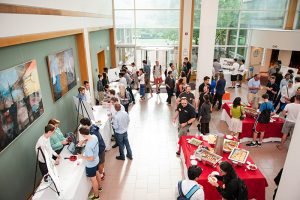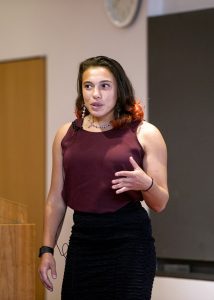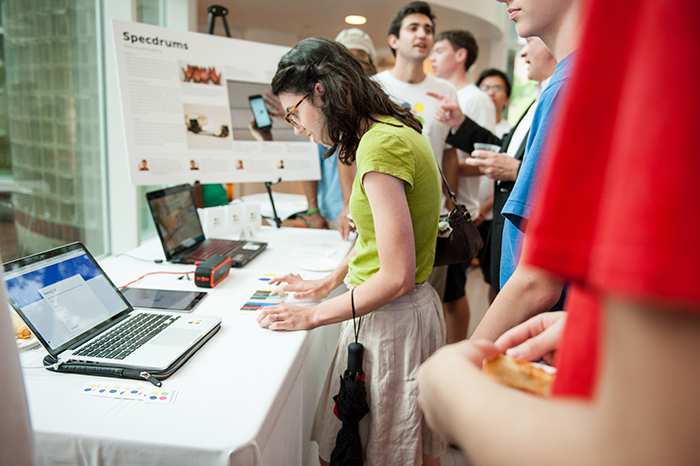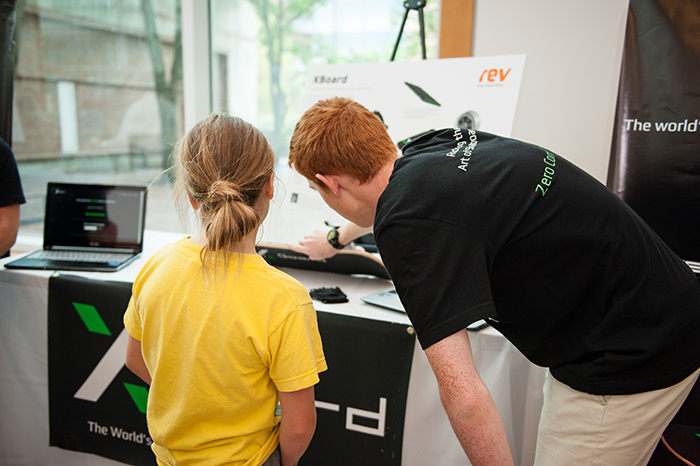
Demo Day 2016: A Student Account
My name is Ruthie Weissmann. You’ve probably already “met” me through my pieces on the Rev blog over the past few months. I’m a newcomer to the world of startups, but working at Rev has been a fantastic opportunity to learn more, quickly.
Each year in August Rev hosts their annual Demo Day, and they’ve asked me to write about the event as I experienced it — not as a part of Rev but as a part of the local community and as someone intrigued by the entrepreneurial spirit. I hope you enjoy a glimpse of this annual event through my eyes. If you visited Demo Day, we’d love to hear your story as well on our Facebook or Twitter pages.
It was August 11th, just before 6:00 pm. Outside, the clouds threatened rain – it was Ithaca, after all. Inside, people bustled about, arranging table displays and setting up video equipment. Eight tables lined the edge of the atrium in Cornell’s Biotechnology building, ornamented with various gadgets, among them an electric skateboard, a large, a brightly colored clock, and silicone rings that could produce over a thousand different sounds. The project teams stood, eagerly awaiting the chance to show off their ideas. Nametags were donned, business cards readied, ties straightened, and shirts smoothed. If the entrepreneurial endeavor is a marathon, this event was the finish line for the cohort in question – and the community had come to watch their victory lap. Demo Day, the conclusion of Rev’s 2016 Hardware Accelerator Program, was their showcase.
The guests arrived in a trickle at first, and then all at once — local business owners, parents, and families. Among the attendees were Cornell faculty members, Dean Sean Reid of Ithaca’s College School of Business, Tompkins County Legislator Martha Robertson, and — of course — the community, who arrived in the form of local business owners, parents, and families.
The eight teams – twenty-one innovators in total, ranging from bright young high school graduates to lifelong residents of Tompkins County – spent the summer in Rev’s Prototyping Shop, poring over 3D printers, laser cutters, circuit boards, and all manner of workshop tools constructing their visions into reality. The 12-week mentoring program follows a sort of “napkin to prototype” model: come in with a concept that is just barely fleshed out, come out with a tangible prototype.
“You may not be able to tell, looking at those prototypes out there,” says Hannah Rudin ‘17, a Cornell Kessler Fellow and one of the 2016 Hardware Accelerator’s four technical instructors, “but behind each of them is a pile of stuff that just didn’t work.” Hannah addressed the crowd at the event. She stressed several things Hardware Accelerator participants do not have to know to join the program: computer engineering, prototyping, the design process, coding, and essentially anything beyond a scalable business idea.
The StopPack team is a great example of Hannah’s point. A group of Ithaca College business students to whom engineering was something of an enigmatic endeavor before the Hardware Accelerator, StopPack finished the program with a functioning electronic cigarette case that acts as a chemical-free smoking cessation method by providing feedback through a tracker app. Extending her arms to the audience, Hannah encouraged anyone with such an idea to reach out to Rev. “These teams came in this summer without products. They just had problems, and they decided that this summer, they were going to solve them.”
Guests were invited to stop at the teams’ tables between pitches and presentations, to experience the fruits of the summer’s labor firsthand. There is a particular feeling of possibility that comes from new technologies and new connections, and the room was abuzz with the glow of having discovered something new.
Specdrums offered attendees the opportunity to test out their product, a musical ring that blends sounds and color; when the user taps a colored surface, a sound plays from the associated app – guitar chords, drum beats, even animal noises. The team laid out several colored paper keyboards for experimentation, and the booth was a fan favorite among attendees.
Across the room, X-Board, a team that’s developing what they call “the world’s first trickable electric skateboard,” held court, showing off their prototype’s capacity for speed and their equally electric logo, a striking lime green X. Using one entire wall of the atrium, Cameron Burbank of ProjecTicker let his Times-Square-esque LED projection ticker tape do the talking.
Between the confabulations, the potato skins were going fast; Cornell Catering provided such sustenance as sriracha meatballs, cucumber wedges, and crispy spring rolls. At 7:00, the Rev staff was beginning to corral attendees into the adjacent auditorium for the main event: a series of pitches from the teams themselves, sharing the eight new businesses’ coming-of-age stories and their plans for the future. Hardware Accelerator Program Director Ken Rother took the stage. Rother, an Entrepreneur-in-Residence at Rev, thanked the night’s guests of honor and gave a brief description of the program before introducing the entrepreneurs.
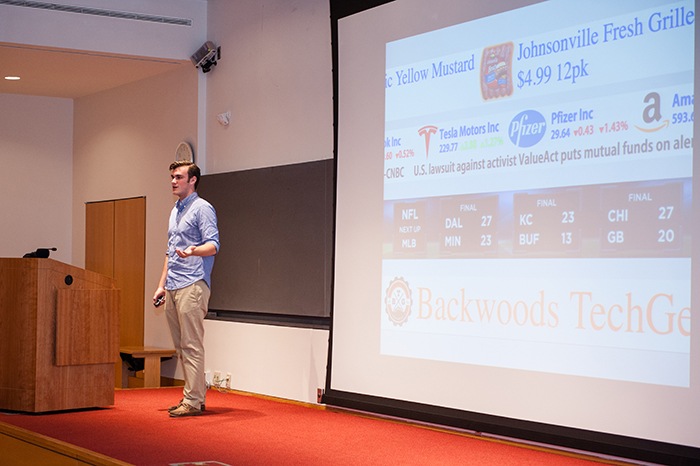

Demo Day includes a pitch for each team’s prototype; shown here is Cameron Burbank with ProjecTicker.
“We had everything from a team that included three Ph.D. biomedical engineers, to a team of three business students that probably never soldered a wire in their life,” said Rother in a quote from the Cornell Chronicle. “If you look at what people came in with, and what they’re leaving with in terms of their business and technical skills sets, we’re very happy.”
The five-minute pitches were accompanied by product demonstrations and other props. Pitching is a chance for new businesses to prove they’ve done their homework, and the 2016 Hardware Accelerator teams certainly had. Jason Guss, of team FlexIt, cited facts and figures to support his team’s product, an ergonomic glove designed to track hand movements to combat carpal tunnel in the workplace.
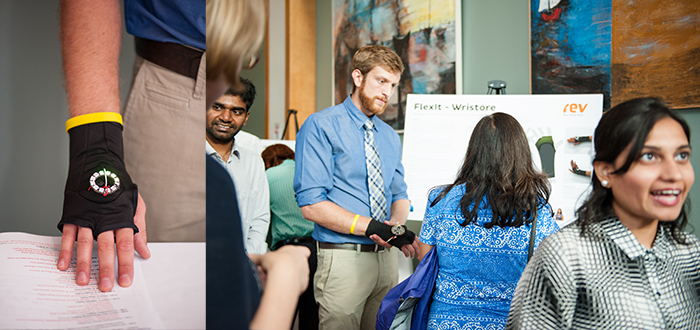

Team FlexIt’s prototype, Wristore, provides the wearer with immediate feedback on unsafe wrist positions.
The audience chuckled at jokes from Zach Leidig of KoalaClock, who showcased the clock his team created to help parents and their children manage daily tasks together. “Parents in the room can probably relate to this,” said Leidig in his pitch, gesturing to the image of a child with his hands over his ears – protesting chores, maybe? – on the projector behind him.
When the pitches concluded, it was half past 8:00pm and the clouds had cleared. Members of the audience returned to the atrium, seeking out teams they’d been impressed by to learn more about their projects. It was an opportunity for the 2016 Hardware Accelerator teams to reach potential investors and connect with potential team members. When asked about these efforts later, Hunter Hartshorne of team Hillside Hydro grinned. “I’m still writing emails to all the people I got business cards from.”
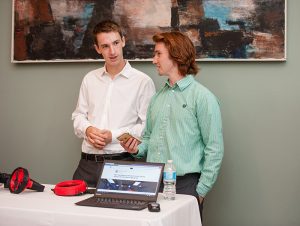

Friends Hunter Hartshorne and Jasper White made the most of their Hardware Accelerator experience and attracted widespread notice.
Hillside Hydro showed a stream-powered generator for savvy campers looking to charge their phones on the trail. Their potential customers are intrigued by the product, and the press is, too. “It was very exciting to be contact with the local media,” says Hunter Hartshorne. He and his partner, Jasper White, are recent Ithaca High School grads and were recently featured in a WSYR-TV piece about their collaboration with the DeFrees Hydraulics Lab on the Hill. Their media blitz has landed them with not only a fresh stack of business cards, but also an internship offer and new networking connections at an international outdoor brand.


Joe Chipalowsky (right) shares his WiFi-enabled furnace-monitoring product, firstWatch, with a guest.
All told, Rev Demo Day drew nearly two hundred people this year. The event shed light on the ever-expanding entrepreneurial community in Ithaca and those who orbit around it. It was a coalescing of two major institutions and their leaders, of local businessmen and women, of students eager to build and faculty looking to bolster of people who believe in fostering connections with motivated individuals. The event is a testament to the entrepreneurial spirit of the Southern Tier and the resilience of twenty-one people who came in with a problem they believed was worth solving. “There’s really a critical mass to it,” says Tom Schryver, Director of the Cornell Center for Regional Economic Advancement (CREA), the Center at Cornell that manages Rev. “By bringing these people together, we enable creative collision. The more connections we foster, the more this community grows and encourages other to grow.”
To read more about the 2016 Rev Hardware Accelerator teams, click here.

